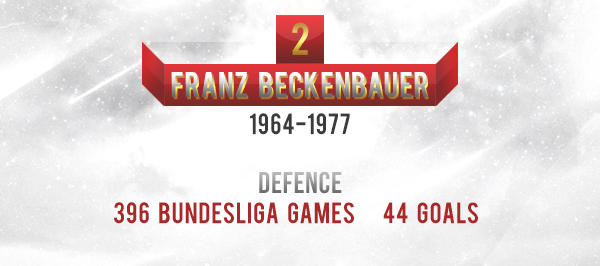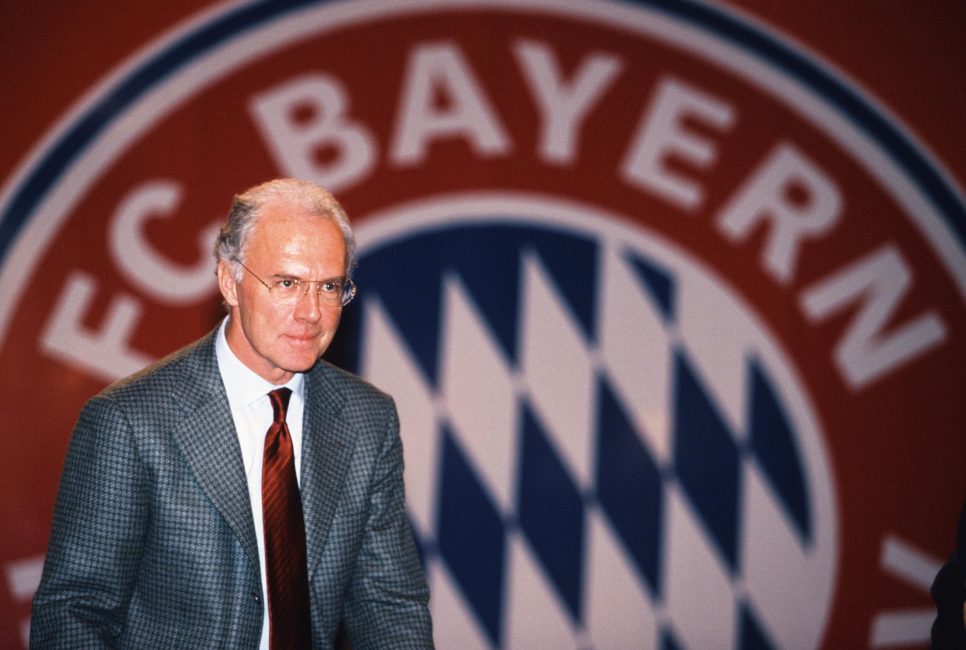Miasanrot Awards: 2nd Place

2nd Place: Franz Beckenbauer
by Tobias Günther
Franz Beckenbauer was widely regarded as a figurehead, as the ultimate representative of German football, and as an immaculate figure of light. And if you think back to his standing after the successful World Cup triple (captain in 1974, coach in 1990, OC boss in 2006), it is striking how much his reputation seems to have suffered from the revelations of recent times. Franz Beckenbauer couldn’t really do anything wrong. If he fathered illegitimate children, he took care of the next generation of German soccer players; while a couple of stars failed to convert any of their shots on the “Sportstudio Torwand”, he effortlessly even made a legendary shot off the top of a Weißbier glass. Franz Beckenbauer was the lucky charm of German football, who seemed to succeed in anything he tried. He was even blamed for the proverbial “Kaiserwetter” during the summer fairy tale – half jokingly, but only half.
And yet the Kaiser’s seemingly boundless homage was based on a certain scepticism, which at least the footballer Franz Beckenbauer had to fight against during his career and which lasted through the years up to the 1974 World Cup title. Basically, Franz Beckenbauer was less a representative of German football than an anomaly of it. Because the football virtues considered typical of German football were not his profession at all: fighting, ploughing, badgering. All these activities were not alien to him, but unlike most of his contemporaries, his game was not based on these attributes, which in many places are still regarded as the epitome of “honest” or “real” football.
“Beckenbauer does not sweat, he perspires“
In the 60s/70s football players were already earning more money than the average viewer. As a link between fans and footballers and as a kind of justification for the salaries, we had the visible proof that the professionals had gone to their physical limits, “eaten grass”, had worked their asses off. Beckenbauer’s apparently aristocratic playing style, however, often suggested that he had either not exerted himself enough (in the event of a defeat) or that he had not even had to exert himself at all (in the event of a victory), and had not earned his success, or in other words did not deserve it.
“Beckenbauer doesn’t sweat, he perspires,” they said jokingly, but it was not uncommon for suspicious opinions to be expressed as to whether his jersey hadn’t stayed much too clean, while the Schwarzenbecks and Roths had to do the dirty work for him. As late as 1974, when he was reigning World Champion, European Champion and European Cup winner, when he also proved his fighting power and duel strength in games such as against Sweden or Poland, Gerd Ruge wrote about him as a “cool star” who was “not a man of the people, by far not as popular as Uwe Seeler” and doubted “that Beckenbauer would retain the popularity that Max Schmeling still enjoys today”.

(Image: Peter Schatz/Bongarts/Getty Images)
“Vivere a testa alta“
“Vivere a testa alta” (translated as “living with a raised head”) was an article about Franz Beckenbauer once aptly titled in the “Gazzetta dello Sport”, which referred both to his successful career path and his way of playing. As a player, Beckenbauer never looked down on the ball; he simply didn’t have to look down on it, as he always knew where it was. This gift, based on his phenomenal feeling for the ball, blessed Beckenbauer with a game overview unlike any other. At the same time, this overview made it possible for him to free himself from even the tightest playing situations by means of 180-degree turns, without falling into a trap.
It made no difference to him whether he was in the middle circle or in his own 5-meter area. Even before such a word became part of the football vocabulary, Beckenbauer was the incarnated resistance to pressing, and he often hesitated to play his ball until the very last moment, even in the most extreme pressure situations, in order to give his target player a small time advantage in ball processing. Most of the time he used the outer instep for these effortless passes, which also gave them a particularly majestic touch and always made it look as if he was shaking the balls out of his ankle. His love for the outside of his foot went so far that he regularly preferred the left outside of his foot to the right inside or the right instep (his 25m free kick against Lew Jaschin at the 1966 World Cup is early proof of this).
Beckenbauer’s legacy
His vision of the game also made it possible for Beckenbauer to avoid having to find his way to the front in the game. Even the narrowest spaces remained playable for him, his vertical passes found their way countless times to his preferred target player Gerd Müller through several opponents. If there had been a pairing rating at that time, Beckenbauer would have left the competition behind.
Beckenbauer’s preference for the direct route through the middle was so important for the Bayern game that this way of playing was to remain a hallmark of FCB even years after his departure. In addition, the fact that Bayern Munich’s football, in contrast to the stormy Gladbachers, for example, was generally characterized as calculated, wait-and-see and not very intoxicating had something to do directly with Beckenbauer. Because from the moment Beckenbauer played the role of Libero, the director and game designer of the FCB was a defensive player. After winning the ball, it simply took a while until Beckenbauer found his way forward and had the ball on his feet.
It is particularly noteworthy how well measured and rational Beckenbauer used his technical skills. Countless step overs on the spot or tricks without gaining space were not his thing. His graceful and unique movements made him an event worth seeing. Even in games that were not so good, he was a player who stood out from the rest. However, he didn’t play many bad games. His worst season as a Bayern player, according to the average score of Kicker, was his last season in the Bavarian dress 1976/77 with a score of 2.0. Additionally, in the rankings list of German football, which was also drawn up by Kicker, he was classified an inconceivably 27 times as world class. From 1966 to 1977, there were just two times that he was not ranked as world class, in the winter winters of 1967 and 1973, but “only” as international class, and only in 1967 was he not ranked #1 in his position.
For me personally, Franz Beckenbauer is the best footballer Germany has ever produced. His significant role in the development of football in Germany can hardly be overestimated, even in a negative sense. For it is due to his outstanding work that many (youth) coaches in Germany did not place their most talented players in the 10th position, but instead used them as liberos. The position of the libero and thus the jersey number 5 possessed such a high prestige for decades that it remained popular until the new millennium, when the back four had long been established elsewhere.
In this respect, Franz Beckenbauer has indirectly set German football back by years. There is nothing wrong with playing the game with a libero when the position is interpreted by a player like Beckenbauer. But there has never been such a footballer in Germany, or anywhere else in the world, since. And it is questionable whether that player will ever exist again.





